Business Corporate Law: ADRs, Tribunals, English Legal System Analysis
VerifiedAdded on 2020/01/28
|10
|2852
|49
Report
AI Summary
This report provides an overview of business corporate law, emphasizing the role of Alternative Dispute Resolution (ADRs) and tribunals within the English legal system. It details various ADR methods like conciliation, arbitration, and mediation, along with specific tribunals such as copyright, employment, and competition appeal tribunals. The report highlights the importance of tribunals in reducing the burden on courts and providing efficient dispute resolution, discussing their strengths such as reduced workload and cost-effectiveness, as well as weaknesses like limited scope and appeal rights. The analysis covers the impact of these legal mechanisms on business operations and profitability, offering recommendations for employers and businesses to utilize ADRs effectively and maintain a fair working environment. The report concludes by summarizing the critical role of corporate law in business, the importance of tribunals, and the benefits of utilizing these mechanisms for dispute resolution.
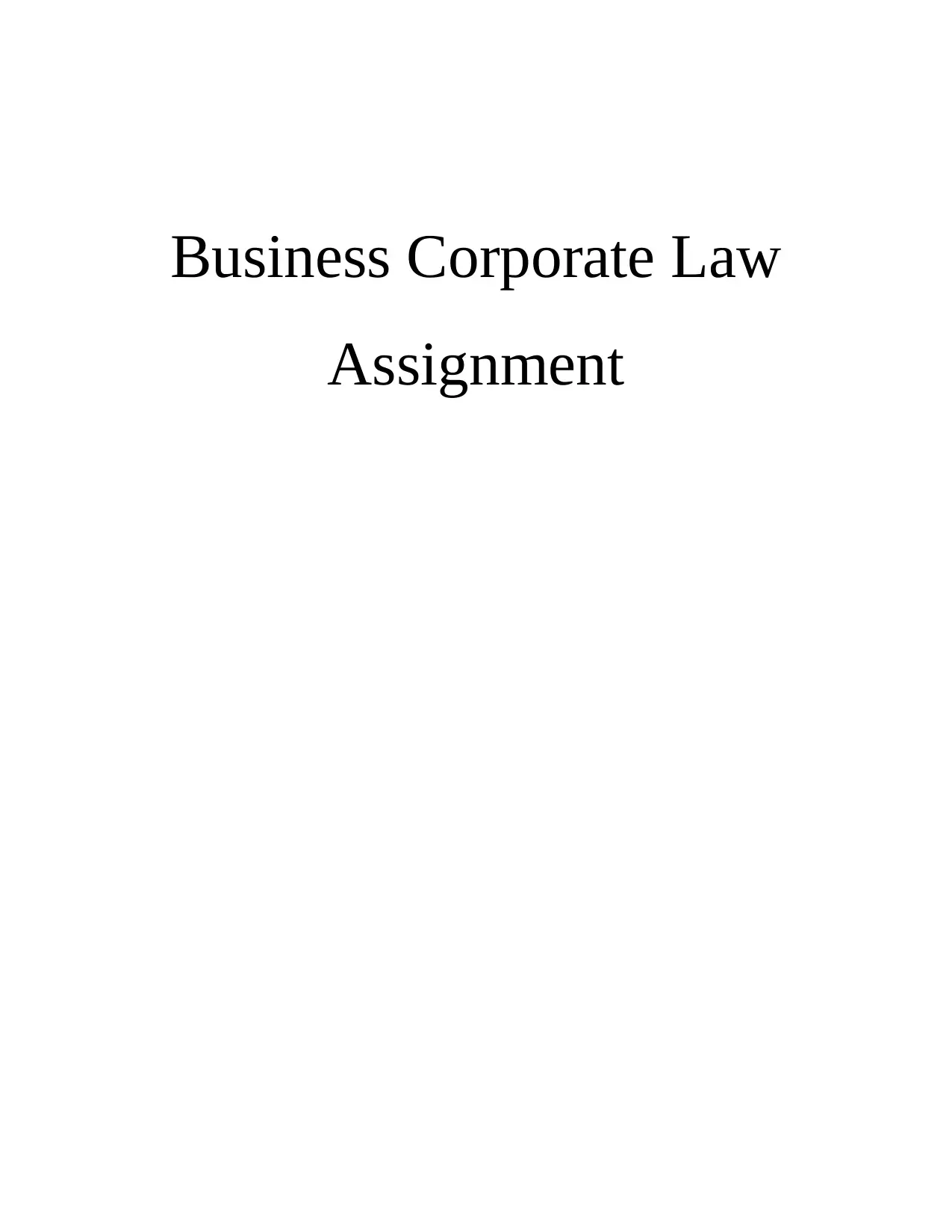
Business Corporate Law
Assignment
Assignment
Paraphrase This Document
Need a fresh take? Get an instant paraphrase of this document with our AI Paraphraser
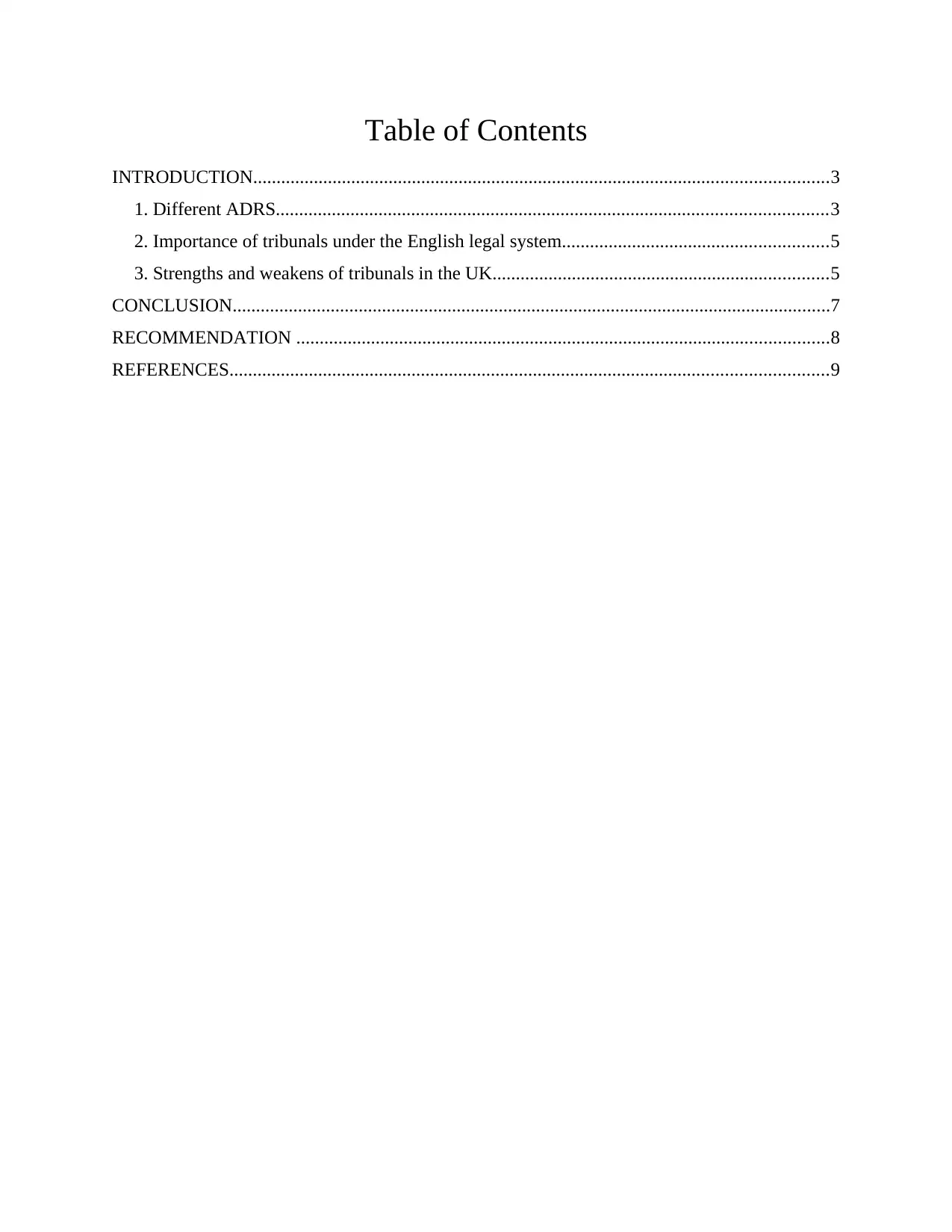
Table of Contents
INTRODUCTION...........................................................................................................................3
1. Different ADRS......................................................................................................................3
2. Importance of tribunals under the English legal system.........................................................5
3. Strengths and weakens of tribunals in the UK........................................................................5
CONCLUSION................................................................................................................................7
RECOMMENDATION ..................................................................................................................8
REFERENCES................................................................................................................................9
INTRODUCTION...........................................................................................................................3
1. Different ADRS......................................................................................................................3
2. Importance of tribunals under the English legal system.........................................................5
3. Strengths and weakens of tribunals in the UK........................................................................5
CONCLUSION................................................................................................................................7
RECOMMENDATION ..................................................................................................................8
REFERENCES................................................................................................................................9
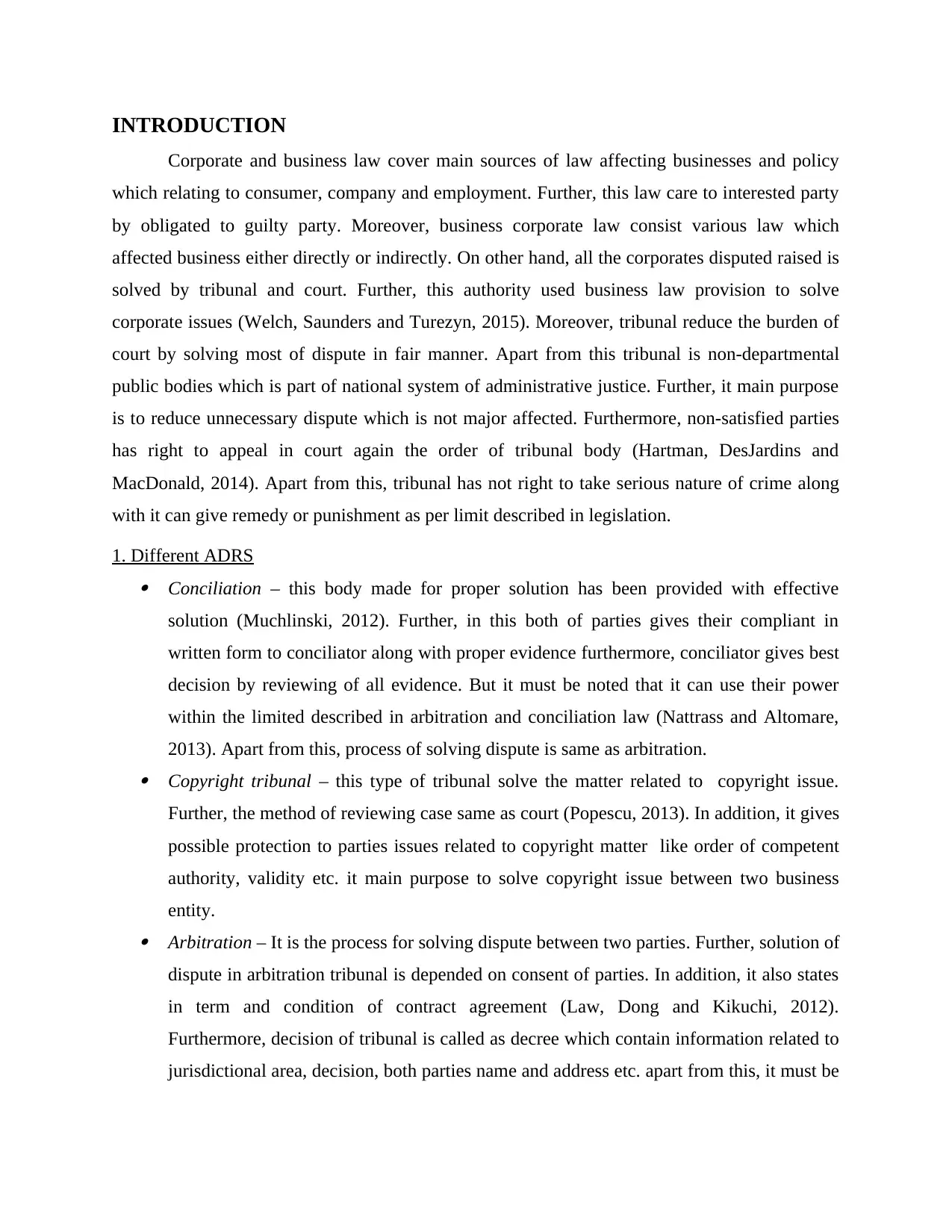
INTRODUCTION
Corporate and business law cover main sources of law affecting businesses and policy
which relating to consumer, company and employment. Further, this law care to interested party
by obligated to guilty party. Moreover, business corporate law consist various law which
affected business either directly or indirectly. On other hand, all the corporates disputed raised is
solved by tribunal and court. Further, this authority used business law provision to solve
corporate issues (Welch, Saunders and Turezyn, 2015). Moreover, tribunal reduce the burden of
court by solving most of dispute in fair manner. Apart from this tribunal is non-departmental
public bodies which is part of national system of administrative justice. Further, it main purpose
is to reduce unnecessary dispute which is not major affected. Furthermore, non-satisfied parties
has right to appeal in court again the order of tribunal body (Hartman, DesJardins and
MacDonald, 2014). Apart from this, tribunal has not right to take serious nature of crime along
with it can give remedy or punishment as per limit described in legislation.
1. Different ADRS Conciliation – this body made for proper solution has been provided with effective
solution (Muchlinski, 2012). Further, in this both of parties gives their compliant in
written form to conciliator along with proper evidence furthermore, conciliator gives best
decision by reviewing of all evidence. But it must be noted that it can use their power
within the limited described in arbitration and conciliation law (Nattrass and Altomare,
2013). Apart from this, process of solving dispute is same as arbitration. Copyright tribunal – this type of tribunal solve the matter related to copyright issue.
Further, the method of reviewing case same as court (Popescu, 2013). In addition, it gives
possible protection to parties issues related to copyright matter like order of competent
authority, validity etc. it main purpose to solve copyright issue between two business
entity. Arbitration – It is the process for solving dispute between two parties. Further, solution of
dispute in arbitration tribunal is depended on consent of parties. In addition, it also states
in term and condition of contract agreement (Law, Dong and Kikuchi, 2012).
Furthermore, decision of tribunal is called as decree which contain information related to
jurisdictional area, decision, both parties name and address etc. apart from this, it must be
Corporate and business law cover main sources of law affecting businesses and policy
which relating to consumer, company and employment. Further, this law care to interested party
by obligated to guilty party. Moreover, business corporate law consist various law which
affected business either directly or indirectly. On other hand, all the corporates disputed raised is
solved by tribunal and court. Further, this authority used business law provision to solve
corporate issues (Welch, Saunders and Turezyn, 2015). Moreover, tribunal reduce the burden of
court by solving most of dispute in fair manner. Apart from this tribunal is non-departmental
public bodies which is part of national system of administrative justice. Further, it main purpose
is to reduce unnecessary dispute which is not major affected. Furthermore, non-satisfied parties
has right to appeal in court again the order of tribunal body (Hartman, DesJardins and
MacDonald, 2014). Apart from this, tribunal has not right to take serious nature of crime along
with it can give remedy or punishment as per limit described in legislation.
1. Different ADRS Conciliation – this body made for proper solution has been provided with effective
solution (Muchlinski, 2012). Further, in this both of parties gives their compliant in
written form to conciliator along with proper evidence furthermore, conciliator gives best
decision by reviewing of all evidence. But it must be noted that it can use their power
within the limited described in arbitration and conciliation law (Nattrass and Altomare,
2013). Apart from this, process of solving dispute is same as arbitration. Copyright tribunal – this type of tribunal solve the matter related to copyright issue.
Further, the method of reviewing case same as court (Popescu, 2013). In addition, it gives
possible protection to parties issues related to copyright matter like order of competent
authority, validity etc. it main purpose to solve copyright issue between two business
entity. Arbitration – It is the process for solving dispute between two parties. Further, solution of
dispute in arbitration tribunal is depended on consent of parties. In addition, it also states
in term and condition of contract agreement (Law, Dong and Kikuchi, 2012).
Furthermore, decision of tribunal is called as decree which contain information related to
jurisdictional area, decision, both parties name and address etc. apart from this, it must be
⊘ This is a preview!⊘
Do you want full access?
Subscribe today to unlock all pages.

Trusted by 1+ million students worldwide
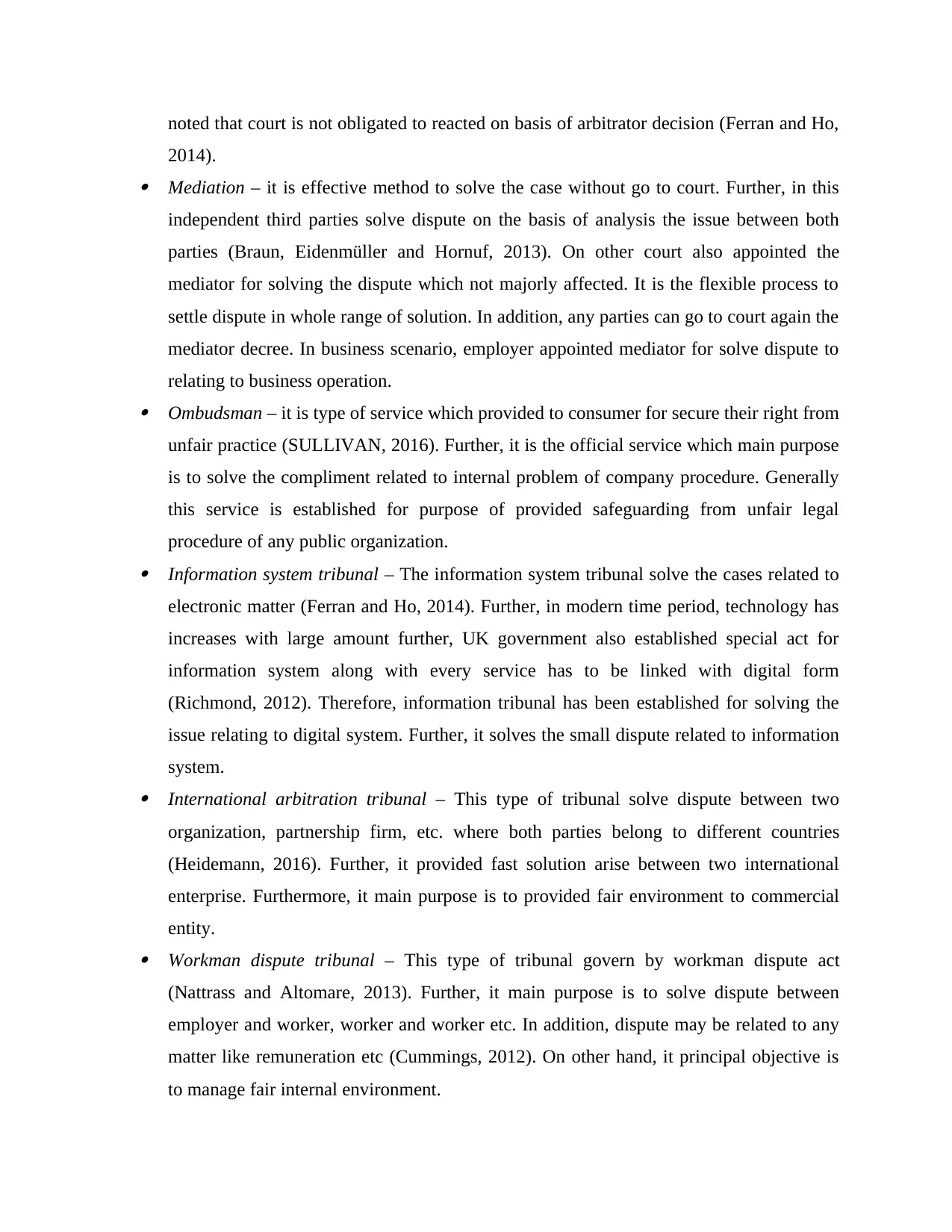
noted that court is not obligated to reacted on basis of arbitrator decision (Ferran and Ho,
2014). Mediation – it is effective method to solve the case without go to court. Further, in this
independent third parties solve dispute on the basis of analysis the issue between both
parties (Braun, Eidenmüller and Hornuf, 2013). On other court also appointed the
mediator for solving the dispute which not majorly affected. It is the flexible process to
settle dispute in whole range of solution. In addition, any parties can go to court again the
mediator decree. In business scenario, employer appointed mediator for solve dispute to
relating to business operation. Ombudsman – it is type of service which provided to consumer for secure their right from
unfair practice (SULLIVAN, 2016). Further, it is the official service which main purpose
is to solve the compliment related to internal problem of company procedure. Generally
this service is established for purpose of provided safeguarding from unfair legal
procedure of any public organization. Information system tribunal – The information system tribunal solve the cases related to
electronic matter (Ferran and Ho, 2014). Further, in modern time period, technology has
increases with large amount further, UK government also established special act for
information system along with every service has to be linked with digital form
(Richmond, 2012). Therefore, information tribunal has been established for solving the
issue relating to digital system. Further, it solves the small dispute related to information
system. International arbitration tribunal – This type of tribunal solve dispute between two
organization, partnership firm, etc. where both parties belong to different countries
(Heidemann, 2016). Further, it provided fast solution arise between two international
enterprise. Furthermore, it main purpose is to provided fair environment to commercial
entity. Workman dispute tribunal – This type of tribunal govern by workman dispute act
(Nattrass and Altomare, 2013). Further, it main purpose is to solve dispute between
employer and worker, worker and worker etc. In addition, dispute may be related to any
matter like remuneration etc (Cummings, 2012). On other hand, it principal objective is
to manage fair internal environment.
2014). Mediation – it is effective method to solve the case without go to court. Further, in this
independent third parties solve dispute on the basis of analysis the issue between both
parties (Braun, Eidenmüller and Hornuf, 2013). On other court also appointed the
mediator for solving the dispute which not majorly affected. It is the flexible process to
settle dispute in whole range of solution. In addition, any parties can go to court again the
mediator decree. In business scenario, employer appointed mediator for solve dispute to
relating to business operation. Ombudsman – it is type of service which provided to consumer for secure their right from
unfair practice (SULLIVAN, 2016). Further, it is the official service which main purpose
is to solve the compliment related to internal problem of company procedure. Generally
this service is established for purpose of provided safeguarding from unfair legal
procedure of any public organization. Information system tribunal – The information system tribunal solve the cases related to
electronic matter (Ferran and Ho, 2014). Further, in modern time period, technology has
increases with large amount further, UK government also established special act for
information system along with every service has to be linked with digital form
(Richmond, 2012). Therefore, information tribunal has been established for solving the
issue relating to digital system. Further, it solves the small dispute related to information
system. International arbitration tribunal – This type of tribunal solve dispute between two
organization, partnership firm, etc. where both parties belong to different countries
(Heidemann, 2016). Further, it provided fast solution arise between two international
enterprise. Furthermore, it main purpose is to provided fair environment to commercial
entity. Workman dispute tribunal – This type of tribunal govern by workman dispute act
(Nattrass and Altomare, 2013). Further, it main purpose is to solve dispute between
employer and worker, worker and worker etc. In addition, dispute may be related to any
matter like remuneration etc (Cummings, 2012). On other hand, it principal objective is
to manage fair internal environment.
Paraphrase This Document
Need a fresh take? Get an instant paraphrase of this document with our AI Paraphraser
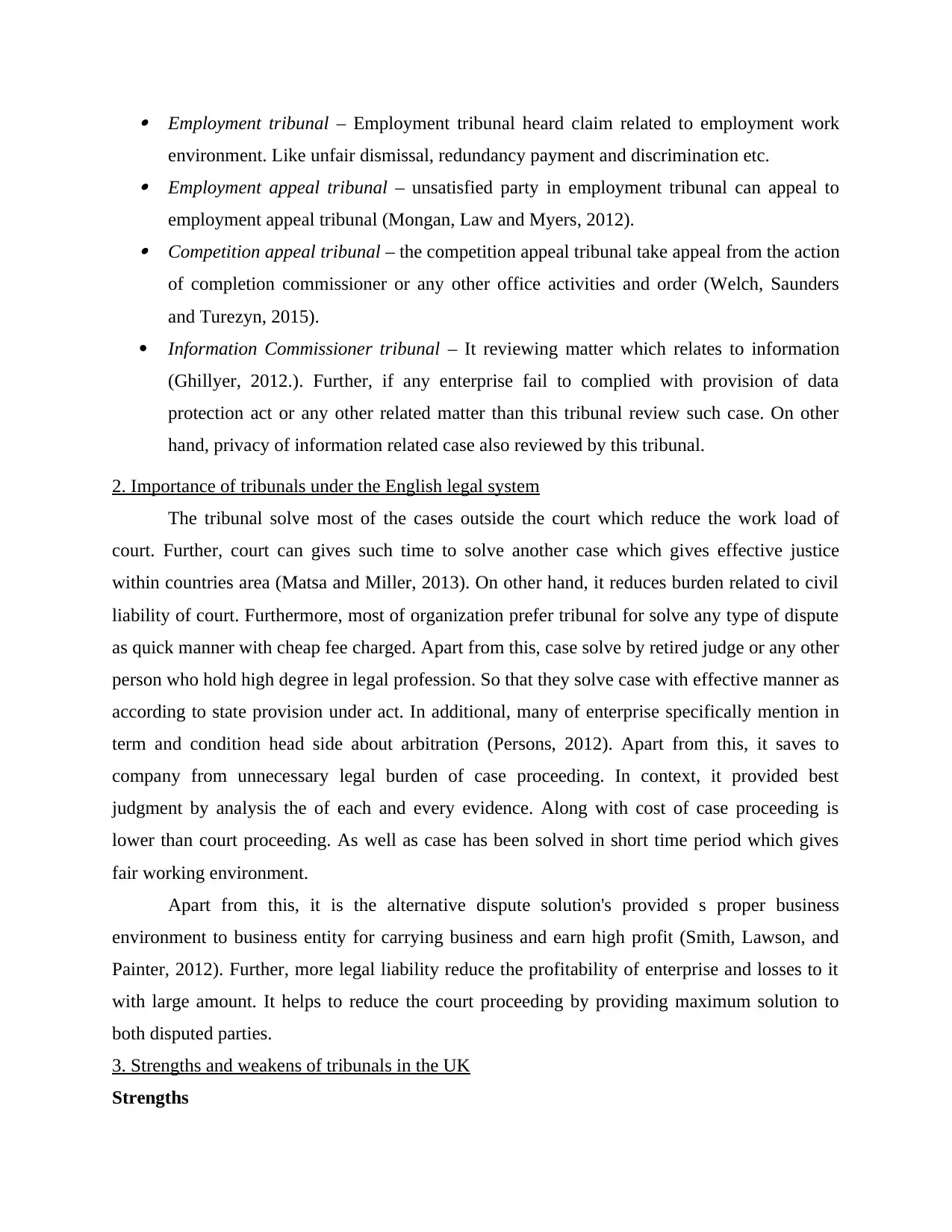
Employment tribunal – Employment tribunal heard claim related to employment work
environment. Like unfair dismissal, redundancy payment and discrimination etc. Employment appeal tribunal – unsatisfied party in employment tribunal can appeal to
employment appeal tribunal (Mongan, Law and Myers, 2012). Competition appeal tribunal – the competition appeal tribunal take appeal from the action
of completion commissioner or any other office activities and order (Welch, Saunders
and Turezyn, 2015).
Information Commissioner tribunal – It reviewing matter which relates to information
(Ghillyer, 2012.). Further, if any enterprise fail to complied with provision of data
protection act or any other related matter than this tribunal review such case. On other
hand, privacy of information related case also reviewed by this tribunal.
2. Importance of tribunals under the English legal system
The tribunal solve most of the cases outside the court which reduce the work load of
court. Further, court can gives such time to solve another case which gives effective justice
within countries area (Matsa and Miller, 2013). On other hand, it reduces burden related to civil
liability of court. Furthermore, most of organization prefer tribunal for solve any type of dispute
as quick manner with cheap fee charged. Apart from this, case solve by retired judge or any other
person who hold high degree in legal profession. So that they solve case with effective manner as
according to state provision under act. In additional, many of enterprise specifically mention in
term and condition head side about arbitration (Persons, 2012). Apart from this, it saves to
company from unnecessary legal burden of case proceeding. In context, it provided best
judgment by analysis the of each and every evidence. Along with cost of case proceeding is
lower than court proceeding. As well as case has been solved in short time period which gives
fair working environment.
Apart from this, it is the alternative dispute solution's provided s proper business
environment to business entity for carrying business and earn high profit (Smith, Lawson, and
Painter, 2012). Further, more legal liability reduce the profitability of enterprise and losses to it
with large amount. It helps to reduce the court proceeding by providing maximum solution to
both disputed parties.
3. Strengths and weakens of tribunals in the UK
Strengths
environment. Like unfair dismissal, redundancy payment and discrimination etc. Employment appeal tribunal – unsatisfied party in employment tribunal can appeal to
employment appeal tribunal (Mongan, Law and Myers, 2012). Competition appeal tribunal – the competition appeal tribunal take appeal from the action
of completion commissioner or any other office activities and order (Welch, Saunders
and Turezyn, 2015).
Information Commissioner tribunal – It reviewing matter which relates to information
(Ghillyer, 2012.). Further, if any enterprise fail to complied with provision of data
protection act or any other related matter than this tribunal review such case. On other
hand, privacy of information related case also reviewed by this tribunal.
2. Importance of tribunals under the English legal system
The tribunal solve most of the cases outside the court which reduce the work load of
court. Further, court can gives such time to solve another case which gives effective justice
within countries area (Matsa and Miller, 2013). On other hand, it reduces burden related to civil
liability of court. Furthermore, most of organization prefer tribunal for solve any type of dispute
as quick manner with cheap fee charged. Apart from this, case solve by retired judge or any other
person who hold high degree in legal profession. So that they solve case with effective manner as
according to state provision under act. In additional, many of enterprise specifically mention in
term and condition head side about arbitration (Persons, 2012). Apart from this, it saves to
company from unnecessary legal burden of case proceeding. In context, it provided best
judgment by analysis the of each and every evidence. Along with cost of case proceeding is
lower than court proceeding. As well as case has been solved in short time period which gives
fair working environment.
Apart from this, it is the alternative dispute solution's provided s proper business
environment to business entity for carrying business and earn high profit (Smith, Lawson, and
Painter, 2012). Further, more legal liability reduce the profitability of enterprise and losses to it
with large amount. It helps to reduce the court proceeding by providing maximum solution to
both disputed parties.
3. Strengths and weakens of tribunals in the UK
Strengths
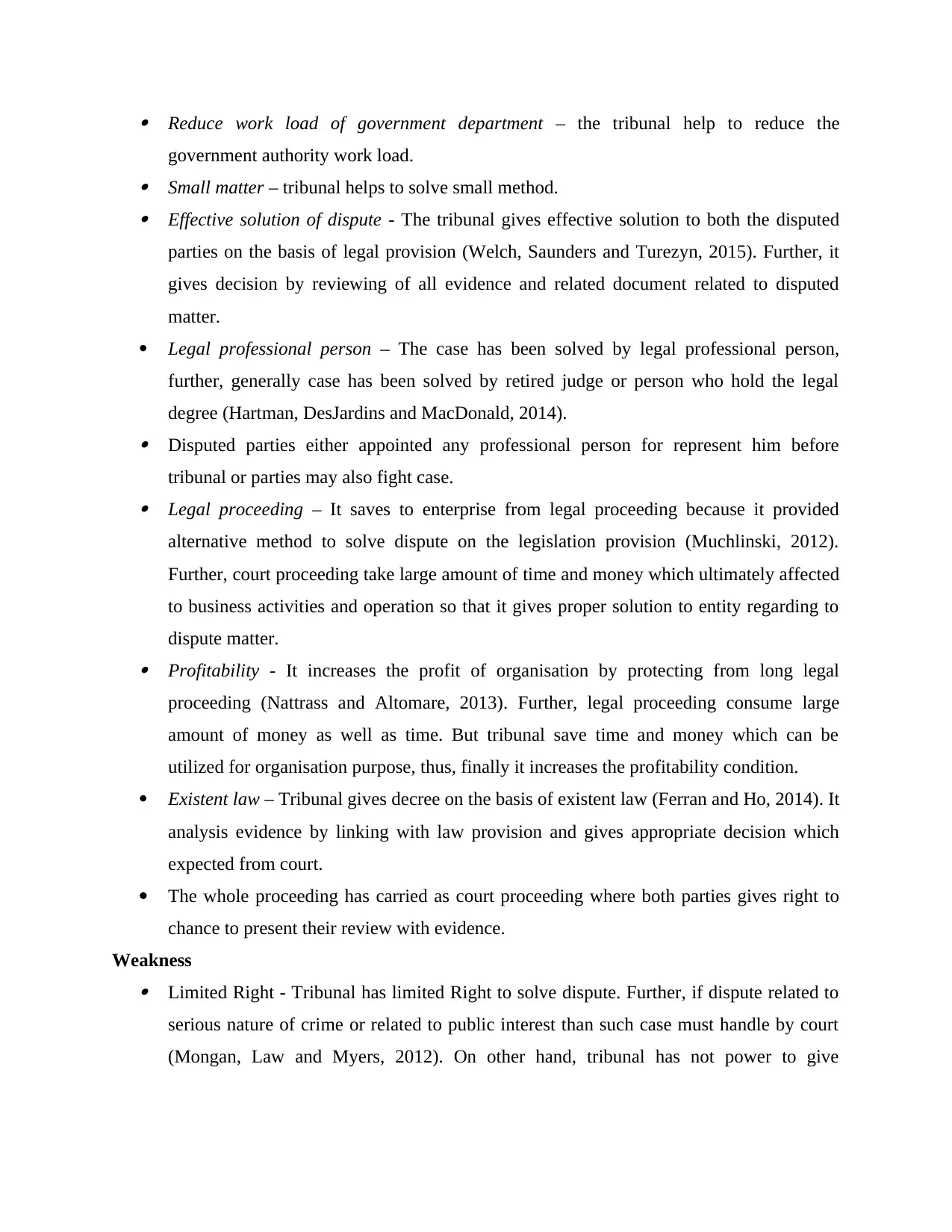
Reduce work load of government department – the tribunal help to reduce the
government authority work load. Small matter – tribunal helps to solve small method. Effective solution of dispute - The tribunal gives effective solution to both the disputed
parties on the basis of legal provision (Welch, Saunders and Turezyn, 2015). Further, it
gives decision by reviewing of all evidence and related document related to disputed
matter.
Legal professional person – The case has been solved by legal professional person,
further, generally case has been solved by retired judge or person who hold the legal
degree (Hartman, DesJardins and MacDonald, 2014). Disputed parties either appointed any professional person for represent him before
tribunal or parties may also fight case. Legal proceeding – It saves to enterprise from legal proceeding because it provided
alternative method to solve dispute on the legislation provision (Muchlinski, 2012).
Further, court proceeding take large amount of time and money which ultimately affected
to business activities and operation so that it gives proper solution to entity regarding to
dispute matter. Profitability - It increases the profit of organisation by protecting from long legal
proceeding (Nattrass and Altomare, 2013). Further, legal proceeding consume large
amount of money as well as time. But tribunal save time and money which can be
utilized for organisation purpose, thus, finally it increases the profitability condition.
Existent law – Tribunal gives decree on the basis of existent law (Ferran and Ho, 2014). It
analysis evidence by linking with law provision and gives appropriate decision which
expected from court.
The whole proceeding has carried as court proceeding where both parties gives right to
chance to present their review with evidence.
Weakness Limited Right - Tribunal has limited Right to solve dispute. Further, if dispute related to
serious nature of crime or related to public interest than such case must handle by court
(Mongan, Law and Myers, 2012). On other hand, tribunal has not power to give
government authority work load. Small matter – tribunal helps to solve small method. Effective solution of dispute - The tribunal gives effective solution to both the disputed
parties on the basis of legal provision (Welch, Saunders and Turezyn, 2015). Further, it
gives decision by reviewing of all evidence and related document related to disputed
matter.
Legal professional person – The case has been solved by legal professional person,
further, generally case has been solved by retired judge or person who hold the legal
degree (Hartman, DesJardins and MacDonald, 2014). Disputed parties either appointed any professional person for represent him before
tribunal or parties may also fight case. Legal proceeding – It saves to enterprise from legal proceeding because it provided
alternative method to solve dispute on the legislation provision (Muchlinski, 2012).
Further, court proceeding take large amount of time and money which ultimately affected
to business activities and operation so that it gives proper solution to entity regarding to
dispute matter. Profitability - It increases the profit of organisation by protecting from long legal
proceeding (Nattrass and Altomare, 2013). Further, legal proceeding consume large
amount of money as well as time. But tribunal save time and money which can be
utilized for organisation purpose, thus, finally it increases the profitability condition.
Existent law – Tribunal gives decree on the basis of existent law (Ferran and Ho, 2014). It
analysis evidence by linking with law provision and gives appropriate decision which
expected from court.
The whole proceeding has carried as court proceeding where both parties gives right to
chance to present their review with evidence.
Weakness Limited Right - Tribunal has limited Right to solve dispute. Further, if dispute related to
serious nature of crime or related to public interest than such case must handle by court
(Mongan, Law and Myers, 2012). On other hand, tribunal has not power to give
⊘ This is a preview!⊘
Do you want full access?
Subscribe today to unlock all pages.

Trusted by 1+ million students worldwide
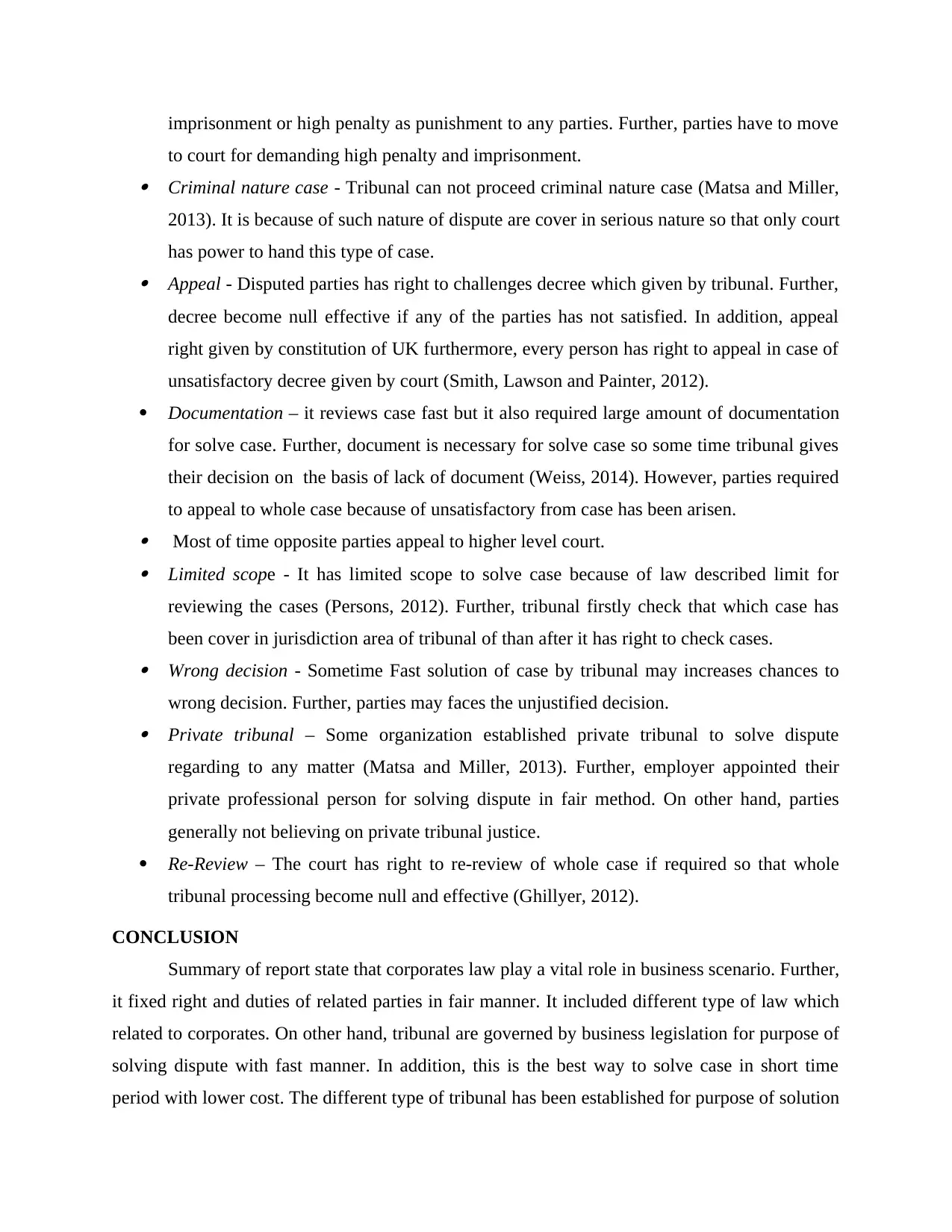
imprisonment or high penalty as punishment to any parties. Further, parties have to move
to court for demanding high penalty and imprisonment. Criminal nature case - Tribunal can not proceed criminal nature case (Matsa and Miller,
2013). It is because of such nature of dispute are cover in serious nature so that only court
has power to hand this type of case. Appeal - Disputed parties has right to challenges decree which given by tribunal. Further,
decree become null effective if any of the parties has not satisfied. In addition, appeal
right given by constitution of UK furthermore, every person has right to appeal in case of
unsatisfactory decree given by court (Smith, Lawson and Painter, 2012).
Documentation – it reviews case fast but it also required large amount of documentation
for solve case. Further, document is necessary for solve case so some time tribunal gives
their decision on the basis of lack of document (Weiss, 2014). However, parties required
to appeal to whole case because of unsatisfactory from case has been arisen. Most of time opposite parties appeal to higher level court. Limited scope - It has limited scope to solve case because of law described limit for
reviewing the cases (Persons, 2012). Further, tribunal firstly check that which case has
been cover in jurisdiction area of tribunal of than after it has right to check cases. Wrong decision - Sometime Fast solution of case by tribunal may increases chances to
wrong decision. Further, parties may faces the unjustified decision. Private tribunal – Some organization established private tribunal to solve dispute
regarding to any matter (Matsa and Miller, 2013). Further, employer appointed their
private professional person for solving dispute in fair method. On other hand, parties
generally not believing on private tribunal justice.
Re-Review – The court has right to re-review of whole case if required so that whole
tribunal processing become null and effective (Ghillyer, 2012).
CONCLUSION
Summary of report state that corporates law play a vital role in business scenario. Further,
it fixed right and duties of related parties in fair manner. It included different type of law which
related to corporates. On other hand, tribunal are governed by business legislation for purpose of
solving dispute with fast manner. In addition, this is the best way to solve case in short time
period with lower cost. The different type of tribunal has been established for purpose of solution
to court for demanding high penalty and imprisonment. Criminal nature case - Tribunal can not proceed criminal nature case (Matsa and Miller,
2013). It is because of such nature of dispute are cover in serious nature so that only court
has power to hand this type of case. Appeal - Disputed parties has right to challenges decree which given by tribunal. Further,
decree become null effective if any of the parties has not satisfied. In addition, appeal
right given by constitution of UK furthermore, every person has right to appeal in case of
unsatisfactory decree given by court (Smith, Lawson and Painter, 2012).
Documentation – it reviews case fast but it also required large amount of documentation
for solve case. Further, document is necessary for solve case so some time tribunal gives
their decision on the basis of lack of document (Weiss, 2014). However, parties required
to appeal to whole case because of unsatisfactory from case has been arisen. Most of time opposite parties appeal to higher level court. Limited scope - It has limited scope to solve case because of law described limit for
reviewing the cases (Persons, 2012). Further, tribunal firstly check that which case has
been cover in jurisdiction area of tribunal of than after it has right to check cases. Wrong decision - Sometime Fast solution of case by tribunal may increases chances to
wrong decision. Further, parties may faces the unjustified decision. Private tribunal – Some organization established private tribunal to solve dispute
regarding to any matter (Matsa and Miller, 2013). Further, employer appointed their
private professional person for solving dispute in fair method. On other hand, parties
generally not believing on private tribunal justice.
Re-Review – The court has right to re-review of whole case if required so that whole
tribunal processing become null and effective (Ghillyer, 2012).
CONCLUSION
Summary of report state that corporates law play a vital role in business scenario. Further,
it fixed right and duties of related parties in fair manner. It included different type of law which
related to corporates. On other hand, tribunal are governed by business legislation for purpose of
solving dispute with fast manner. In addition, this is the best way to solve case in short time
period with lower cost. The different type of tribunal has been established for purpose of solution
Paraphrase This Document
Need a fresh take? Get an instant paraphrase of this document with our AI Paraphraser
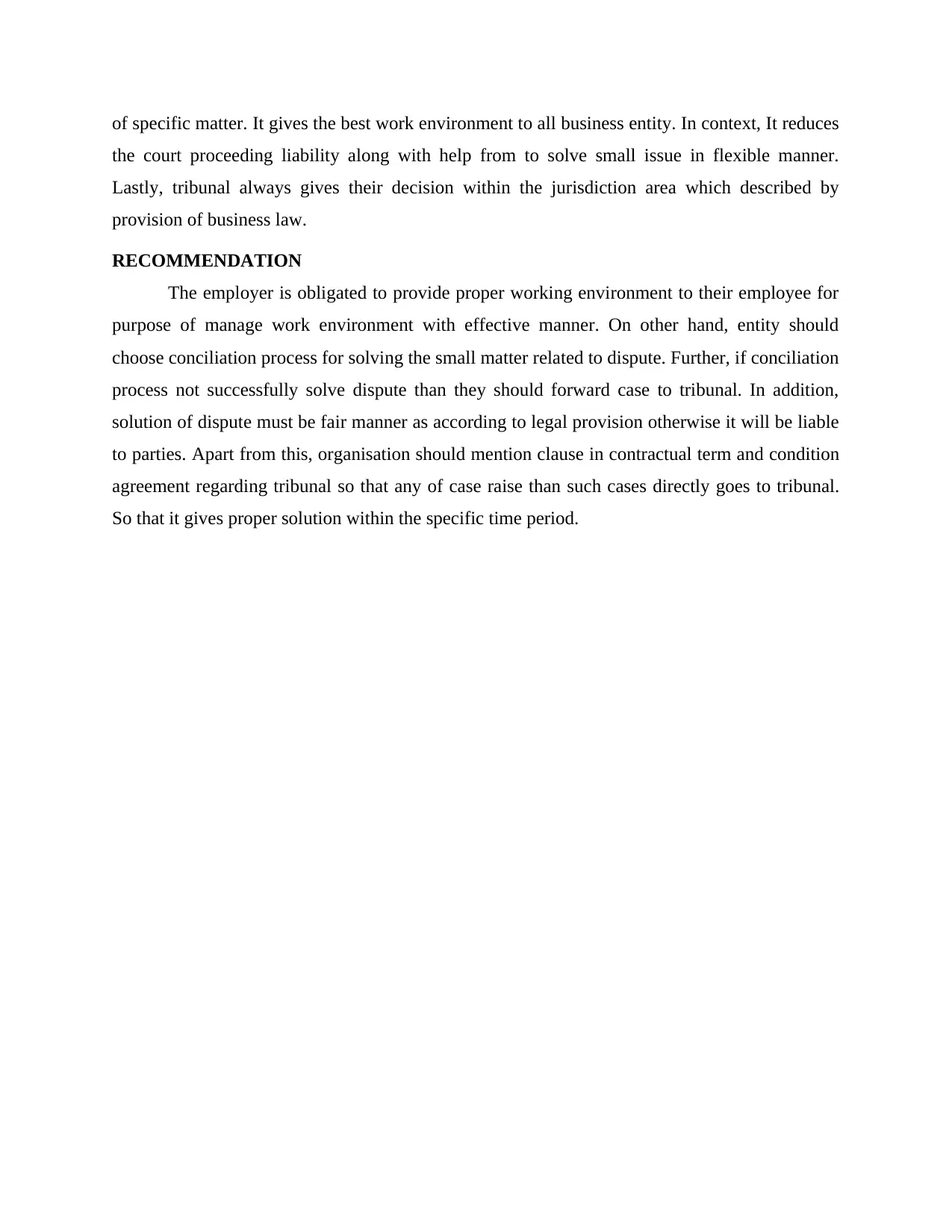
of specific matter. It gives the best work environment to all business entity. In context, It reduces
the court proceeding liability along with help from to solve small issue in flexible manner.
Lastly, tribunal always gives their decision within the jurisdiction area which described by
provision of business law.
RECOMMENDATION
The employer is obligated to provide proper working environment to their employee for
purpose of manage work environment with effective manner. On other hand, entity should
choose conciliation process for solving the small matter related to dispute. Further, if conciliation
process not successfully solve dispute than they should forward case to tribunal. In addition,
solution of dispute must be fair manner as according to legal provision otherwise it will be liable
to parties. Apart from this, organisation should mention clause in contractual term and condition
agreement regarding tribunal so that any of case raise than such cases directly goes to tribunal.
So that it gives proper solution within the specific time period.
the court proceeding liability along with help from to solve small issue in flexible manner.
Lastly, tribunal always gives their decision within the jurisdiction area which described by
provision of business law.
RECOMMENDATION
The employer is obligated to provide proper working environment to their employee for
purpose of manage work environment with effective manner. On other hand, entity should
choose conciliation process for solving the small matter related to dispute. Further, if conciliation
process not successfully solve dispute than they should forward case to tribunal. In addition,
solution of dispute must be fair manner as according to legal provision otherwise it will be liable
to parties. Apart from this, organisation should mention clause in contractual term and condition
agreement regarding tribunal so that any of case raise than such cases directly goes to tribunal.
So that it gives proper solution within the specific time period.
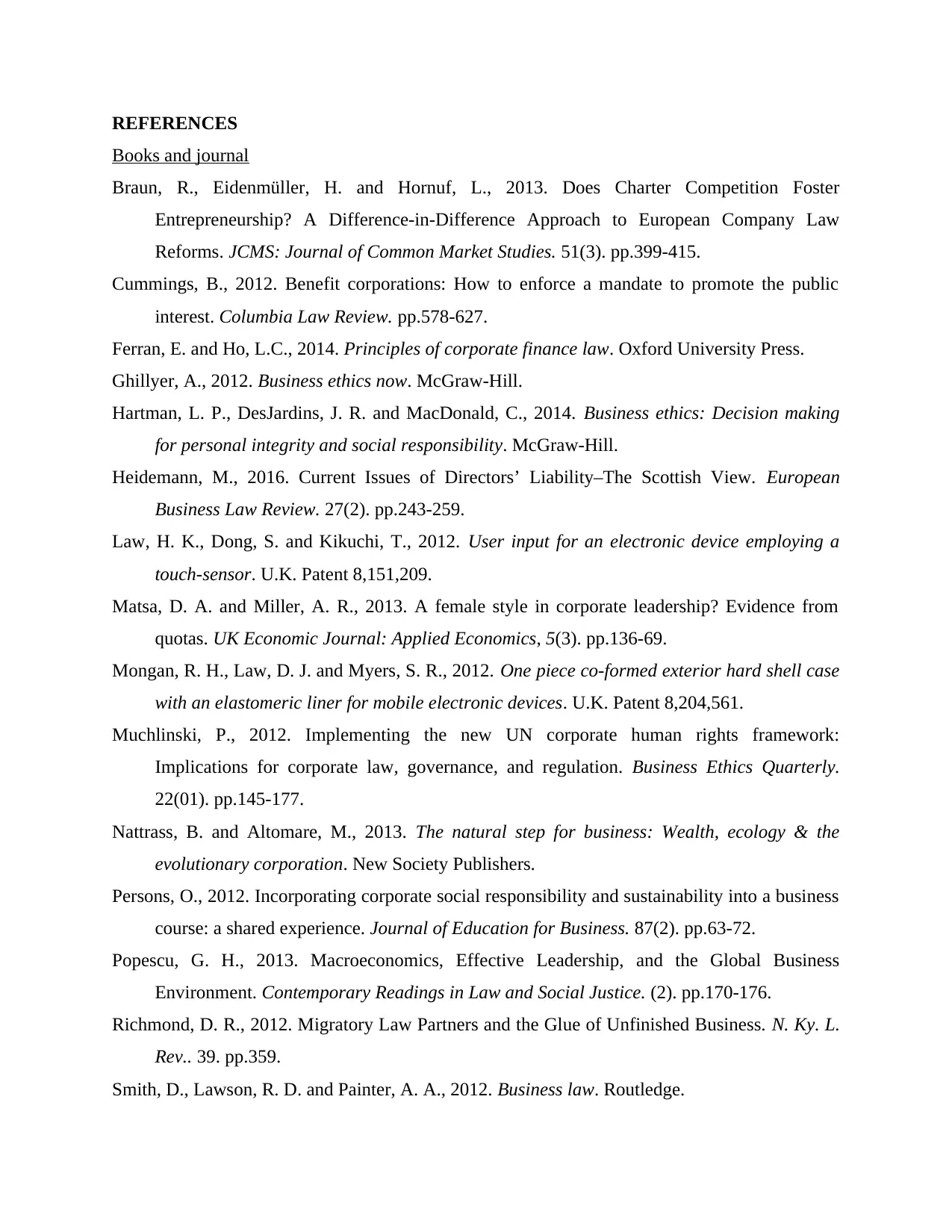
REFERENCES
Books and journal
Braun, R., Eidenmüller, H. and Hornuf, L., 2013. Does Charter Competition Foster
Entrepreneurship? A Difference‐in‐Difference Approach to European Company Law
Reforms. JCMS: Journal of Common Market Studies. 51(3). pp.399-415.
Cummings, B., 2012. Benefit corporations: How to enforce a mandate to promote the public
interest. Columbia Law Review. pp.578-627.
Ferran, E. and Ho, L.C., 2014. Principles of corporate finance law. Oxford University Press.
Ghillyer, A., 2012. Business ethics now. McGraw-Hill.
Hartman, L. P., DesJardins, J. R. and MacDonald, C., 2014. Business ethics: Decision making
for personal integrity and social responsibility. McGraw-Hill.
Heidemann, M., 2016. Current Issues of Directors’ Liability–The Scottish View. European
Business Law Review. 27(2). pp.243-259.
Law, H. K., Dong, S. and Kikuchi, T., 2012. User input for an electronic device employing a
touch-sensor. U.K. Patent 8,151,209.
Matsa, D. A. and Miller, A. R., 2013. A female style in corporate leadership? Evidence from
quotas. UK Economic Journal: Applied Economics, 5(3). pp.136-69.
Mongan, R. H., Law, D. J. and Myers, S. R., 2012. One piece co-formed exterior hard shell case
with an elastomeric liner for mobile electronic devices. U.K. Patent 8,204,561.
Muchlinski, P., 2012. Implementing the new UN corporate human rights framework:
Implications for corporate law, governance, and regulation. Business Ethics Quarterly.
22(01). pp.145-177.
Nattrass, B. and Altomare, M., 2013. The natural step for business: Wealth, ecology & the
evolutionary corporation. New Society Publishers.
Persons, O., 2012. Incorporating corporate social responsibility and sustainability into a business
course: a shared experience. Journal of Education for Business. 87(2). pp.63-72.
Popescu, G. H., 2013. Macroeconomics, Effective Leadership, and the Global Business
Environment. Contemporary Readings in Law and Social Justice. (2). pp.170-176.
Richmond, D. R., 2012. Migratory Law Partners and the Glue of Unfinished Business. N. Ky. L.
Rev.. 39. pp.359.
Smith, D., Lawson, R. D. and Painter, A. A., 2012. Business law. Routledge.
Books and journal
Braun, R., Eidenmüller, H. and Hornuf, L., 2013. Does Charter Competition Foster
Entrepreneurship? A Difference‐in‐Difference Approach to European Company Law
Reforms. JCMS: Journal of Common Market Studies. 51(3). pp.399-415.
Cummings, B., 2012. Benefit corporations: How to enforce a mandate to promote the public
interest. Columbia Law Review. pp.578-627.
Ferran, E. and Ho, L.C., 2014. Principles of corporate finance law. Oxford University Press.
Ghillyer, A., 2012. Business ethics now. McGraw-Hill.
Hartman, L. P., DesJardins, J. R. and MacDonald, C., 2014. Business ethics: Decision making
for personal integrity and social responsibility. McGraw-Hill.
Heidemann, M., 2016. Current Issues of Directors’ Liability–The Scottish View. European
Business Law Review. 27(2). pp.243-259.
Law, H. K., Dong, S. and Kikuchi, T., 2012. User input for an electronic device employing a
touch-sensor. U.K. Patent 8,151,209.
Matsa, D. A. and Miller, A. R., 2013. A female style in corporate leadership? Evidence from
quotas. UK Economic Journal: Applied Economics, 5(3). pp.136-69.
Mongan, R. H., Law, D. J. and Myers, S. R., 2012. One piece co-formed exterior hard shell case
with an elastomeric liner for mobile electronic devices. U.K. Patent 8,204,561.
Muchlinski, P., 2012. Implementing the new UN corporate human rights framework:
Implications for corporate law, governance, and regulation. Business Ethics Quarterly.
22(01). pp.145-177.
Nattrass, B. and Altomare, M., 2013. The natural step for business: Wealth, ecology & the
evolutionary corporation. New Society Publishers.
Persons, O., 2012. Incorporating corporate social responsibility and sustainability into a business
course: a shared experience. Journal of Education for Business. 87(2). pp.63-72.
Popescu, G. H., 2013. Macroeconomics, Effective Leadership, and the Global Business
Environment. Contemporary Readings in Law and Social Justice. (2). pp.170-176.
Richmond, D. R., 2012. Migratory Law Partners and the Glue of Unfinished Business. N. Ky. L.
Rev.. 39. pp.359.
Smith, D., Lawson, R. D. and Painter, A. A., 2012. Business law. Routledge.
⊘ This is a preview!⊘
Do you want full access?
Subscribe today to unlock all pages.

Trusted by 1+ million students worldwide
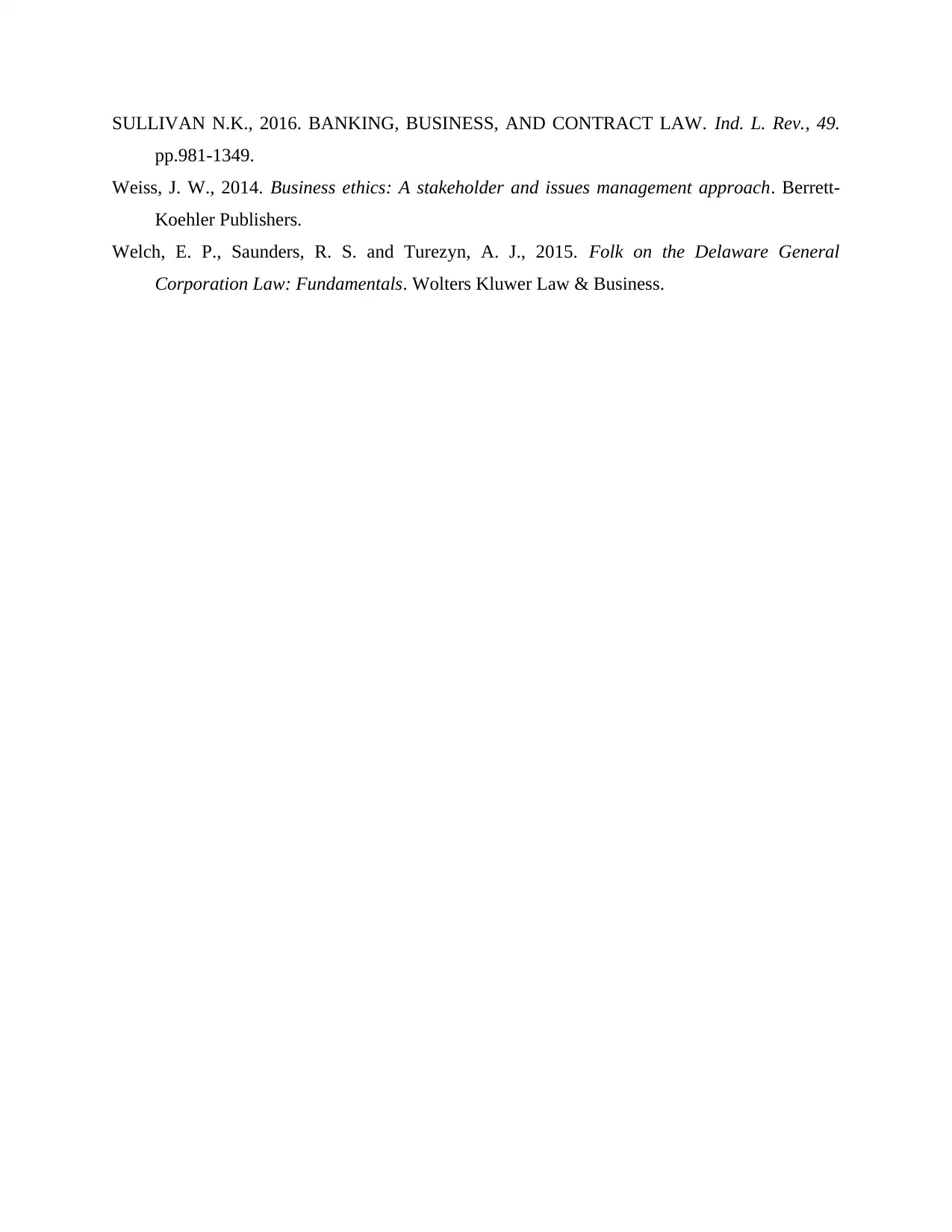
SULLIVAN N.K., 2016. BANKING, BUSINESS, AND CONTRACT LAW. Ind. L. Rev., 49.
pp.981-1349.
Weiss, J. W., 2014. Business ethics: A stakeholder and issues management approach. Berrett-
Koehler Publishers.
Welch, E. P., Saunders, R. S. and Turezyn, A. J., 2015. Folk on the Delaware General
Corporation Law: Fundamentals. Wolters Kluwer Law & Business.
pp.981-1349.
Weiss, J. W., 2014. Business ethics: A stakeholder and issues management approach. Berrett-
Koehler Publishers.
Welch, E. P., Saunders, R. S. and Turezyn, A. J., 2015. Folk on the Delaware General
Corporation Law: Fundamentals. Wolters Kluwer Law & Business.
1 out of 10
Related Documents
Your All-in-One AI-Powered Toolkit for Academic Success.
+13062052269
info@desklib.com
Available 24*7 on WhatsApp / Email
![[object Object]](/_next/static/media/star-bottom.7253800d.svg)
Unlock your academic potential
Copyright © 2020–2026 A2Z Services. All Rights Reserved. Developed and managed by ZUCOL.





